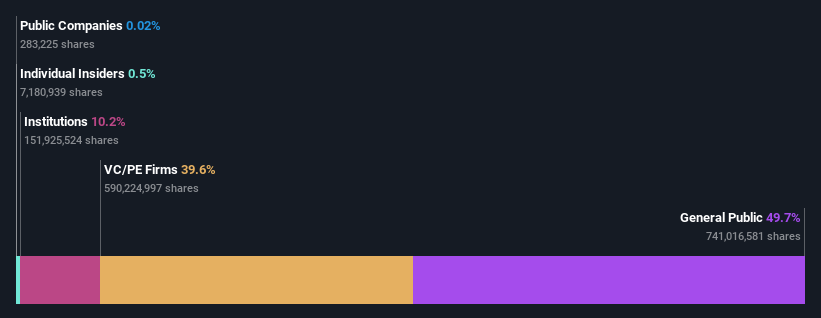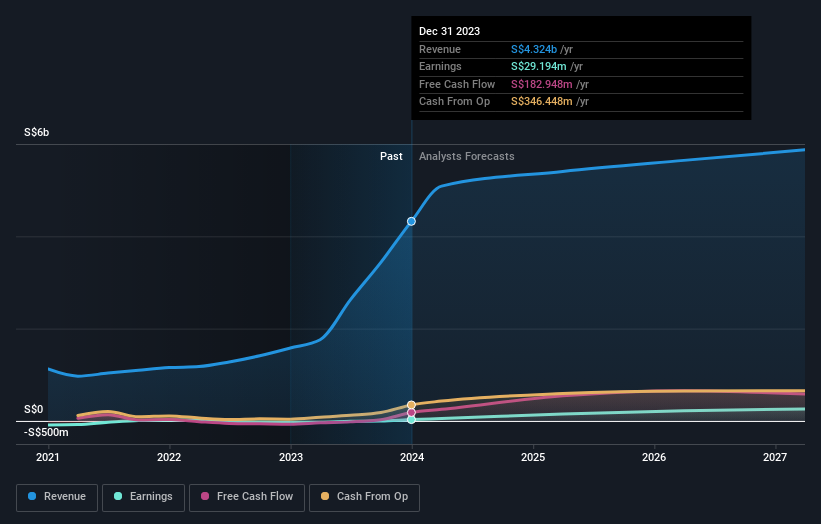SATS Ltd. (SGX:S58) stock most popular amongst retail investors who own 50%, while private equity firms hold 40%
Key Insights
The considerable ownership by retail investors in SATS indicates that they collectively have a greater say in management and business strategy
50% of the business is held by the top 25 shareholders
A look at the shareholders of SATS Ltd. (SGX:S58) can tell us which group is most powerful. We can see that retail investors own the lion's share in the company with 50% ownership. Put another way, the group faces the maximum upside potential (or downside risk).
Meanwhile, private equity firms make up 40% of the company’s shareholders.
Let's delve deeper into each type of owner of SATS, beginning with the chart below.
See our latest analysis for SATS
What Does The Institutional Ownership Tell Us About SATS?
Institutional investors commonly compare their own returns to the returns of a commonly followed index. So they generally do consider buying larger companies that are included in the relevant benchmark index.
We can see that SATS does have institutional investors; and they hold a good portion of the company's stock. This implies the analysts working for those institutions have looked at the stock and they like it. But just like anyone else, they could be wrong. It is not uncommon to see a big share price drop if two large institutional investors try to sell out of a stock at the same time. So it is worth checking the past earnings trajectory of SATS, (below). Of course, keep in mind that there are other factors to consider, too.
SATS is not owned by hedge funds. Looking at our data, we can see that the largest shareholder is Temasek Holdings (Private) Limited with 40% of shares outstanding. In comparison, the second and third largest shareholders hold about 2.2% and 2.2% of the stock.
On studying our ownership data, we found that 25 of the top shareholders collectively own less than 50% of the share register, implying that no single individual has a majority interest.
While studying institutional ownership for a company can add value to your research, it is also a good practice to research analyst recommendations to get a deeper understand of a stock's expected performance. There are a reasonable number of analysts covering the stock, so it might be useful to find out their aggregate view on the future.
Insider Ownership Of SATS
The definition of an insider can differ slightly between different countries, but members of the board of directors always count. Management ultimately answers to the board. However, it is not uncommon for managers to be executive board members, especially if they are a founder or the CEO.
Most consider insider ownership a positive because it can indicate the board is well aligned with other shareholders. However, on some occasions too much power is concentrated within this group.
Our data suggests that insiders own under 1% of SATS Ltd. in their own names. It's a big company, so even a small proportional interest can create alignment between the board and shareholders. In this case insiders own S$18m worth of shares. It is always good to see at least some insider ownership, but it might be worth checking if those insiders have been selling.
General Public Ownership
With a 50% ownership, the general public, mostly comprising of individual investors, have some degree of sway over SATS. This size of ownership, while considerable, may not be enough to change company policy if the decision is not in sync with other large shareholders.
Private Equity Ownership
Private equity firms hold a 40% stake in SATS. This suggests they can be influential in key policy decisions. Sometimes we see private equity stick around for the long term, but generally speaking they have a shorter investment horizon and -- as the name suggests -- don't invest in public companies much. After some time they may look to sell and redeploy capital elsewhere.
Next Steps:
While it is well worth considering the different groups that own a company, there are other factors that are even more important. For example, we've discovered 2 warning signs for SATS (1 doesn't sit too well with us!) that you should be aware of before investing here.
But ultimately it is the future, not the past, that will determine how well the owners of this business will do. Therefore we think it advisable to take a look at this free report showing whether analysts are predicting a brighter future.
NB: Figures in this article are calculated using data from the last twelve months, which refer to the 12-month period ending on the last date of the month the financial statement is dated. This may not be consistent with full year annual report figures.
Have feedback on this article? Concerned about the content? Get in touch with us directly. Alternatively, email editorial-team (at) simplywallst.com.
This article by Simply Wall St is general in nature. We provide commentary based on historical data and analyst forecasts only using an unbiased methodology and our articles are not intended to be financial advice. It does not constitute a recommendation to buy or sell any stock, and does not take account of your objectives, or your financial situation. We aim to bring you long-term focused analysis driven by fundamental data. Note that our analysis may not factor in the latest price-sensitive company announcements or qualitative material. Simply Wall St has no position in any stocks mentioned.

 Yahoo Finance
Yahoo Finance 
